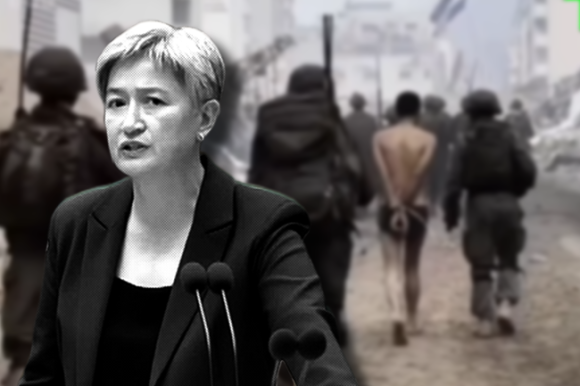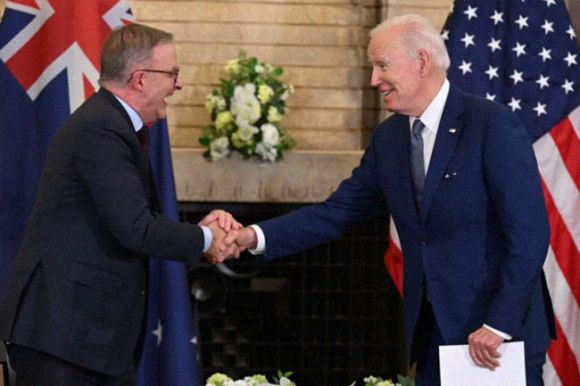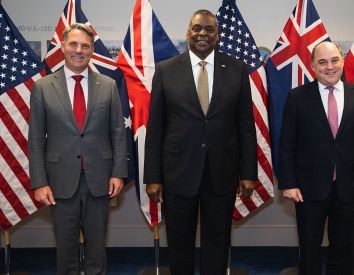Australia needs a wartime government, but instead, we’re collectively sleepwalking through parochial denial about the growing rise of multipolarity and its consequences.
As the Palestinian people undergo a fast-moving genocide, a lesser-known element of this war has been playing out in the background: the U.S. State Department’s Situation Room hasn’t known so many global crises since World War II.
When Russia invaded Ukraine, this came as little surprise to those who had been paying attention to the events of 2014 and NATO’s slow encroachment on Russia’s border. Here in Australia, the nation’s pundits paid little attention to the war even though it inevitably spurred an inflationary crisis starting with the sanctions on oil and gas and then later a hit to the agricultural sector.
Sanctions on Russia came at an economic cost to global citizens while it essentially bolstered Russia’s economy, giving it an opportunity to start pushing the Eastern Bloc and other European countries to trade gas in roubles. The Russian currency has actually never performed so well.
Yet the dominant discourse was centred almost entirely around interest rate rises and whether Woolworths is charging too much. Of course, the supermarket duopolies may well be price gouging, but to think that 2022 inflation rates weren’t a taste of what’s to come is a fool’s game. The ultimate initial driver of inflation was still the reality of supply shortages in an increasingly less secure global security environment.
Now it’s veering into 2024 and Western citizens have been watching a brutal Israeli ethnic cleansing and genocide live-streamed to their phones for months on end. But the current events we see today haven’t happened in a historical vacuum.
Hamas, in the October attacks, was arguably responding to a deal to normalise relations with Israel being struck between the U.S. and Saudi Arabia.
An Arab state signing a deal to normalise relations with Israel from a geopolitical standpoint wouldn’t just have been the news of the decade but it would have been a devastating blow to the Palestinian people. Hamas, by demonstrating the lengths they are willing to go to, in essence, thwarted the deal and spooked the U.S.-allies in Saudi Arabia quite successfully.
Now we are seeing a regional war. Hezbollah has been flanking Hamas to the South. Similarly, Iraqi forces have been responding to the genocide and attacks on their country by attempting to force U.S. troops out of their country.
But the biggest news of all from a global economic and policymaking standpoint has barely received as much coverage. The Ansarallah movement in Yemen has successfully been pulling off a naval blockade, signalling that for the first time in history, Global South nations can, in essence, block the economies of rich nations due to the nature of sophisticated weaponry being now quite cheap.
The Ansarallah movement has seen a genocide in Yemen to the tune of 150,000 killed by Saudi bombing campaigns and 227,000 dead as a result of artificially induced famine and lack of access to health care. Much like Palestine, an unbelievable number of dead have been children — 11,019.
The Ansarallah movement’s goals have been national liberation from the national government, which they say is a Saudi-proxy government. So they have always held steadfast grudges against Saudi allies like the U.S., Britain and, of course, Australia, all of whom also provided weapons to the Saudis.
The Ansarallah movement acquired some weaponry capability during its six wars against the government of Ali Abdullah Sali, but much like Hezbollah, as a mercenary force, it punched well above its weight with the minimal amount of technology it actually had access to.
The success of this naval blockade so far has wide-reaching political and economic consequences. The blockade is already impacting the supply chain.
Oil prices are already climbing again in response to BP and Equinor diverting their shipping away from the Red Sea. Insurers immediately began refusing to insure ships travelling through the Red Sea after they realised that the U.S. bombing of Yemen did little to deter the blockade. All of the four major shipping companies have raised their costs.
Noted Business Standard’s Enda Curran, Jana Randow and Alex Longley:
Volvo Car AB and Tesla Inc. have announced production suspensions at plants in Europe, citing the inability to get components from suppliers in Asia. British retailers Tesco Plc and Marks & Spencer Group Plc have flagged the risk of higher costs. Maersk, the No. 2 container carrier, warned last week that disruptions will last for a few months at least.
By the same token, China and Russia have both been offered safe passage through the Red Sea due to the fact that neither are participating in the war on Gaza. Regardless of what you may make of this, inevitably, if the naval blockade continues, this has drastic economic flow-on effects if China becomes a safer production harbour than the West or Europe.
Either way, once again, we are faced with an inevitable supply-side inflationary crisis. Most politicians and economists likely would agree with this reality; however, what they seem to be ignoring is that this is not just another blip — this is most likely the new normal for at least a decade to come.
The U.S. is stuck at a crossroads where – as countries begin to flee from the dollar and, crucially, the petrodollar is on shakier terms than ever – they are increasingly (from a global security standpoint) being backed into a corner of making riskier decisions.
Or at least this is how U.S. policymakers and the U.S. permanent state will view it. Just like bombing Ansarallah showed their hand by demonstrating that they had not yet any capacity to deter them and funding opponents left Russia barely scathed by the war in Ukraine, so too is the U.S. staring down the barrel of making the same mistake with China.
The U.S. and China are at a stalemate: if China makes any moves towards Taiwan or there is an escalation in the South China Sea, the U.S. either has to accept defeat and the collapse of its perception as the biggest bully in the ocean or accept really quite considerable material costs to themselves in the form of the loss of political hegemony.
Functionally, though, there is no sign of meaningful political diplomacy or calm on the horizon. NATO most recently warned Europe to accept the potential of war with Russia, even warning civilians that they may need to take up arms themselves.
The German Foreign Minister only a few months ago said much the same thing. Most recently, NATO announced the running of Operation Steadfast: the biggest military drill in Europe in recent history, in response to Ukraine, in essence, already having functionally lost the war to Russia — a proxy war against Russia, of course, up until recently, being funded by the U.S., UK and Australia.
If you weren’t aware, you can catch the Ukrainian military in top-of-the-range Australian bush master tanks. However, Ukraine is running out of fighting-age men who haven’t fled the country and U.S. military funding is in limbo, so the Pentagon is resorting to the incredibly desperate move of trying to convince Europe to get on board with seizing Russian financial assets.
This all leads to the potential for a multi-fronted war or, if not conventional war, then, at a minimum, a cold war like we haven’t seen since before the Soviet Union collapsed and we saw harder-line economic warfare.
Australia, as a country in the Asia Pacific but demographically small and with a less impressive military to boot, is caught between a number of bigger players. However, if we don’t as a nation attempt in some way to break from the U.S. alliance, we are being frog-marched into not just economically devastating times ahead but increasingly less secure and dangerous times.
Yet the headlines and the national conversation don’t match even remotely how dire this period of time is. The U.S. has racked up an immense debt to the Chinese while China grew its productive economy and technologically advanced.
There are strong economic incentives for the U.S. to try to contain or, in some way, scare China into submission politically. However, Australia, by comparison, has had a largely economically fruitful relationship with China. Yes, there are arguments to be made that the nation needs to be more protectionist to bolster our labour market, but we are so economically reliant on China in such a way that decoupling from the nation would devastate our economy overnight.
What seems to be the most pressing issue of our time — an issue that, if mishandled, could send human civilisation back to the Stone Age — is barely being discussed with the reverence it deserves. What's more, it's increasingly becoming a fool's game for economists to ignore geopolitics, yet many in Australia continue. We lack a government willing to make bold moves towards political independence from our American foreign masters.
To paraphrase political scientist John Mearsheimer speaking to a room of bureaucrats in Canberra:
“... you will sacrifice prosperity for security… you are either with us or against us, and if you’re against well, we all know what happens, just look at Castro.”
Of course, Australia doesn’t need to look at Fidel Castro; we only need to look as far as Whitlam, but Mearsheimer knew that. In his hubris, Mearsheimer seems to ignore that the realpolitik of this situation is that the world looks nothing like it did in World War II. The original Cold War was marked by a bipolar world: the U.S. and the Soviet Union in a contest for dominance.
Now, we are experiencing a kind of multipolarity. Global South economies across the world are climbing back to prosperity, both China and Russia have formidable military technology. There’s no realistic way for the U.S. to actually win a war with China without unimaginable devastation on both sides.
So, while we quibble about stage three tax cuts, the world is changing rapidly around us. Unless Australia suddenly develops the capacity to think ahead of the next election cycle – in terms of the genuine threat to stability facing the world right now – real economic devastation will just keep arriving at our doorstep.
And by then, it will be too late. We need a wartime government not just because the threat of a certain kind of "world war" is potentially around the corner but because we need a government that can respond by making radical economic decisions to cushion us from the ones that are already happening.
Jemma Nott is a Political Economy post-graduate student at the University of Sydney and a freelance writer.
Related Articles
 This work is licensed under a Creative Commons Attribution-NonCommercial-NoDerivs 3.0 Australia License
This work is licensed under a Creative Commons Attribution-NonCommercial-NoDerivs 3.0 Australia License
Support independent journalism Subscribe to IA.















